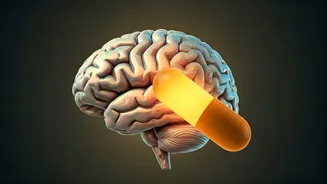The Vitamin D Puzzle
Vitamin D, a fat-soluble vitamin, is crucial for numerous bodily functions. It's often called the 'sunshine vitamin' because our skin synthesizes it when
exposed to sunlight. Beyond bone health, vitamin D influences the immune system, cell growth, and mood regulation. But how does this vital nutrient play a role in the intricate landscape of mental health? Scientists have been investigating a potential link between inadequate vitamin D levels and the onset and severity of depression. As research continues to unfold, this connection offers an exciting avenue for understanding and treating mood disorders.
Depression's Shadowy Grip
Depression, a prevalent and complex mental illness, impacts millions globally. Characterized by persistent sadness, loss of interest, and various physical and emotional symptoms, it significantly diminishes the quality of life. The causes are multifaceted, involving genetic predisposition, environmental factors, and imbalances in brain chemistry. Understanding the complex nature of depression is essential for effective diagnosis, treatment, and support. The link with vitamin D adds another layer to this intricate puzzle, offering potential for improved management and care of this debilitating condition.
Vitamin D's Role Unveiled
Scientists theorize that vitamin D contributes to mood regulation via several mechanisms. Vitamin D receptors are found throughout the brain, particularly in areas related to mood and emotion. Vitamin D could have a direct impact on neurotransmitters, like serotonin, and its receptors, playing a key role in mood stabilization. Moreover, it potentially reduces inflammation in the brain, which has been linked to depression. This multifaceted role suggests that vitamin D isn't merely a passive player but an active participant in brain health.
Evidence Mounting Up
Multiple studies have offered compelling evidence to support the link. Research shows that individuals with depression often exhibit lower vitamin D levels compared to those without the condition. Some studies suggest that vitamin D supplementation may alleviate depressive symptoms in deficient individuals. While the evidence is growing, further research is needed to determine the optimal dosage and long-term effects. The current findings, however, provide a foundation for considering vitamin D in the prevention and treatment of depression.
Implications and Action
The implications of this connection are significant. Vitamin D testing should be considered as part of a comprehensive mental health assessment, especially for individuals with depressive symptoms. Lifestyle adjustments, like increasing sun exposure and dietary changes, can enhance vitamin D levels. Medical professionals may recommend supplementation. Prioritizing vitamin D status could offer an additional avenue for both mental and overall well-being. Always consult with a healthcare provider before making any changes to your health regimen.



















